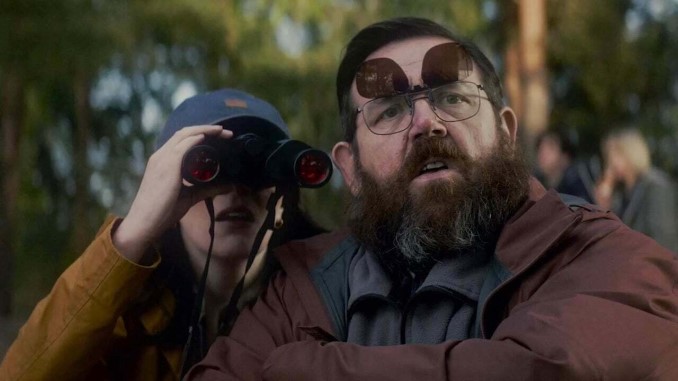Get Away Is a Dour Horror Comedy Saved by its Bonkers Conclusion

The reveal of a twist is a delicate thing around which to base an entire screenplay, particularly in the case of a film that simply doesn’t work particularly well until said twist is deployed. This is the unusual territory that director Steffen Haars’ Get Away, written by star Nick Frost, ventures into–an oddly composed little folk horror quasi-comedy that for 60 minutes struggles against conflicting tones, before suddenly finding its stride as it pushes past the boundaries of expectation in its third act. The obvious question: How much credit does a film earn for deploying that enjoyable transformation, when it comes quite late in the game? Is it too little, too late? When it comes to Get Away, revealing the truth of its intentions a bit earlier might have helped to double down on its most smile-inducing elements, but the overall effect still reads audaciously enough to be memorable in its own right. In other words, this one does just enough to still work well.
The premise has an instantly recognizable outline to it, checking off visual and thematic references to the classic folk horror touchstones you would expect, most prominently The Wicker Man and the Scandinavian influence of Ari Aster’s Midsommar, though it lacks the “midnight sun,” light-drenched eeriness. Frost is playing Richard, the awkward and corny dad of a four-person family unit that also includes pushy wife Susan (Aisling Bea), grumbling son Sam (Sebastian Croft) and fearless daughter Jessie (Maisie Ayres) as they seek to spend a secluded holiday on the tiny, obscure Swedish island of Svälta. It’s unclear what drew the family to such an out-of-the-way locale, though the self-centered Susan at one point suggests that her family might have had history tied to the place’s long-ago tragic backstory. The about-to-occur festival of Karantan is in honor of the island’s quarantining hundreds of years earlier, which led to a horrific era of starvation and cannibalism, all of which is reenacted during the morose island’s sacred festival. Perfect material for a family of U.K. tourists to gawk at, right? Only the most dense horror fan could miss the cultural commentary here, on white Anglo travelers seeking out the dark and personal tragedies of out-of-the-way locales for a bit of morbid voyeurism, under the guise of cultural education.
Nor can the seemingly dense members of the family miss that they are distinctly unwelcome on the island, despite one of the homes indeed having been made available to rent by one of the residents, who seemingly went against local council wishes to host them here. From the moment that Richard and the others arrive on the island, menacing matriarchal leader Klara (Anitta Suikkari) makes it plain: The residents want them gone, and gone immediately. The locals quickly step up their campaign of rudeness and outright intimidation, and it all begs the question: Why don’t Frost and his family simply get out, while the getting is good? Can they not see the threat of death, staring them in the face?
That unvocalized question hangs in the air over the brisk film’s (only 80-some minutes) first hour, as its biggest hang-up becomes the way its two halves–horror-thriller and comedy–bounce off each other, rather than reading as complementary. On one hand, you have the dour folk horror identity, which works pretty well on its own: The people of the island fall back on tradition and the sort of magical thinking that is passed down in the oral tradition, kept alive for hundreds of years out of deference to a local tragedy so profound that they still all feel it in their bones. This more severe half of Get Away centers the island residents rather than the family, highlighting the way that so many of them have handed over their agency to the town’s elders over the years out of respect to the deep, emotional ties to the place’s history that keep them from abandoning what is clearly a place barely fit for human life in the first place. The way the local residents are cajoled toward reluctant violence actually lends them a degree of sympathy or pity not usually present for antagonists in this sort of setting. I was reminded, perhaps, of the pitiable family of cannibals in Jim Mickle’s excellent version of We Are What We Are.
-

-

-

-

-

-

-

-

-

-

-

-

-

-

-

-

-

-

-

-

-

-

-

-

-

-

-

-

-

-

-

-

-

-

-

-

-

-

-

-








































